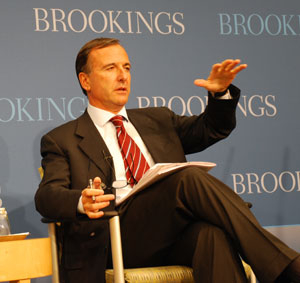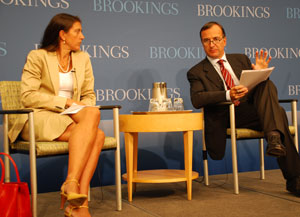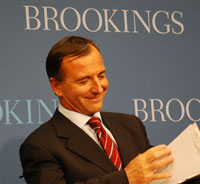|
By Francesco Isgro
Franco Frattini, Italy’s Minister of Foreign Affairs, addressed a group at the Brookings Institution on September 22, 2008, on the topic of “Italy’s Foreign Policy in the new Millennium.” Frattini called for the creation of a new “community of responsible powers” to fill the governance gap existing in the post-Cold War world.

Frattini noted that notwithstanding the success of a pacified and reunified Europe, the end of the Balkan conflict, the enlargement of the European Community and NATO, there is a growing sense that we are not more secure than we were twenty years ago. He pointed to areas of instability such as the Middle East and North Korea, and to conventional threats such as energy, environment, food crisis and the unfolding financial crisis.
“There is a growing gap between the complexity of the world and the international political capacity to respond,” he said. “The emergence of non-Western powers, while indispensable in addressing new challenges, exacerbates the difficulties because they are often interested in “consolidating their positions rather than is sharing costs and responsibilities of global governance.”
The guiding principle of the Cold War, namely the policy of containment, and the pursuit of liberalization and enlargement of the Euro-Atlantic institutions, while successful in the past, can no longer provide “an effective challenge for dealing with the plurality of today’s challenge posed by globalization and international complexity,” he stated.
To fill the governance gap, said Frattini, we need to devise a new and broader paradigm based on principles of “shared responsibility,” what he cal led a “new community of responsible powers,” old and new alike in sharing share common objectives and common responsibilities. led a “new community of responsible powers,” old and new alike in sharing share common objectives and common responsibilities.
This new community should address two key issues: non-proliferation and economic multilateralism. “What our citizens are asking from us comes down to two main things: physical and economic security,” he said. On the issue of nuclear non-proliferation, Frattini called for a “firm and united international front” to make certain that Iran and North Korea comply with international obligations. He also believes that the international community “badly” needs a broader approach to non-proliferation, including strengthening the Nuclear Non-Proliferation Treaty regime. He noted, that Italy, which will hold the G8 presidency in 2009, will put the nonproliferation issue a the top of the G8 agenda.
The second issue that the new community of powers should address is global economic instability. He noted that too many instability factors are crowding people’s lives, including the credit crunch, the volatility of the exchange rate, the energy crisis, food crisis, and the gap between haves and have nots. “We need to seriously, very seriously, reflect on the mechanism of economic governance,” said Frattini. “We need to take into account the interest and views of the new economic actors “in order to create a better functioning economic governance based on effective multilateralism.”

Third, Frattini also would have the new community of responsible powers address regional issues in the Middle East and Afghanistan. To succeed in the Middle East, Frattini said, we will need “ a strong engagement from the next U.S. administration from the very beginning of its term, a stronger European engagement and an active engagement of other key international and regional players. Frattini added that the stabilization of Afghanistan is an “extremely complex undertaking” that will require not only the continuing commitment of the broader community of powers but also a strong regional approach involving Pakistan, India, China and Russia.
Finally, Frattini raised the question of whether the current governance gap could be filled from the “bottom-up” rather than from “top-down,” as has been the history of unilateralism since World War II. “Could we not instead focus first on the attempt to pragmatically create “from below,” for challenging areas, a web of norms and commitments that an ever broader community of responsible powers would subscribe to and commit to share?” he asked. When asked how would that work, Frattini responded that once “we have responded to the preoccupations coming from the population, we will be much stronger in putting on the table the proposals of reform. I prefer to start from the ground, from listening to the people and the bottom up approach instead of a top-down one,” he said.
During the question period Frattini indicated that in light of the international financial turmoil, Italy’s Minister of Finance would propose a new item under the G8 Italian presidency for consideration of a new Bretton Woods, that is, a new global governance in the economic field. Responding to a question regarding immigration, Frattini stated that a European policy was needed to address illegal and legal immigration. He called for a coordinated European approach to deal with countries of origin, countries of transit, and countries of destination. He also noted the pending approval of a European pact for immigration which will welcome those who come legally to Europe but will prevent and fight illegal migration. •
(Published in Voce Italiana, October 2008)
|

![]()

 led a “new community of responsible powers,” old and new alike in sharing share common objectives and common responsibilities.
led a “new community of responsible powers,” old and new alike in sharing share common objectives and common responsibilities.